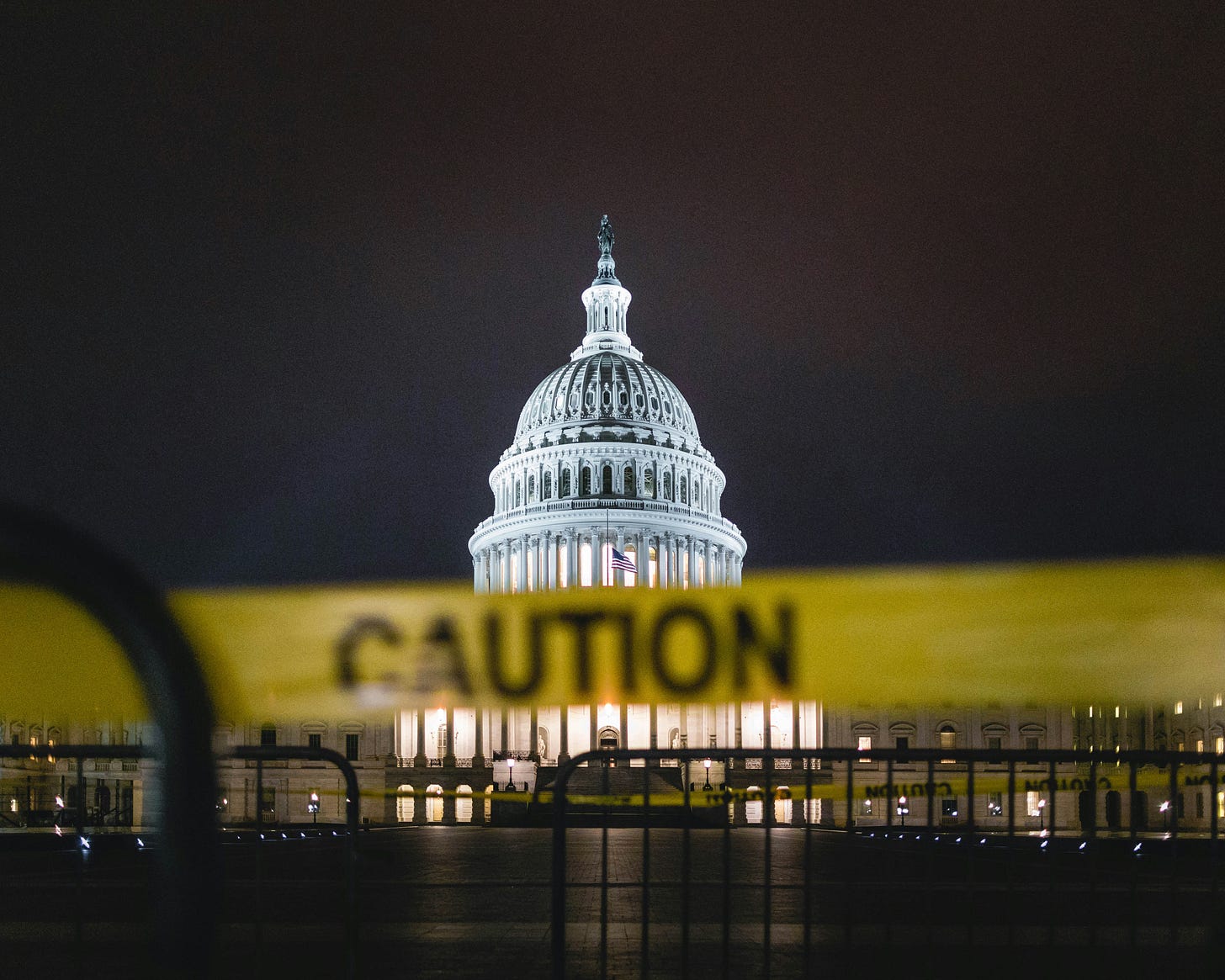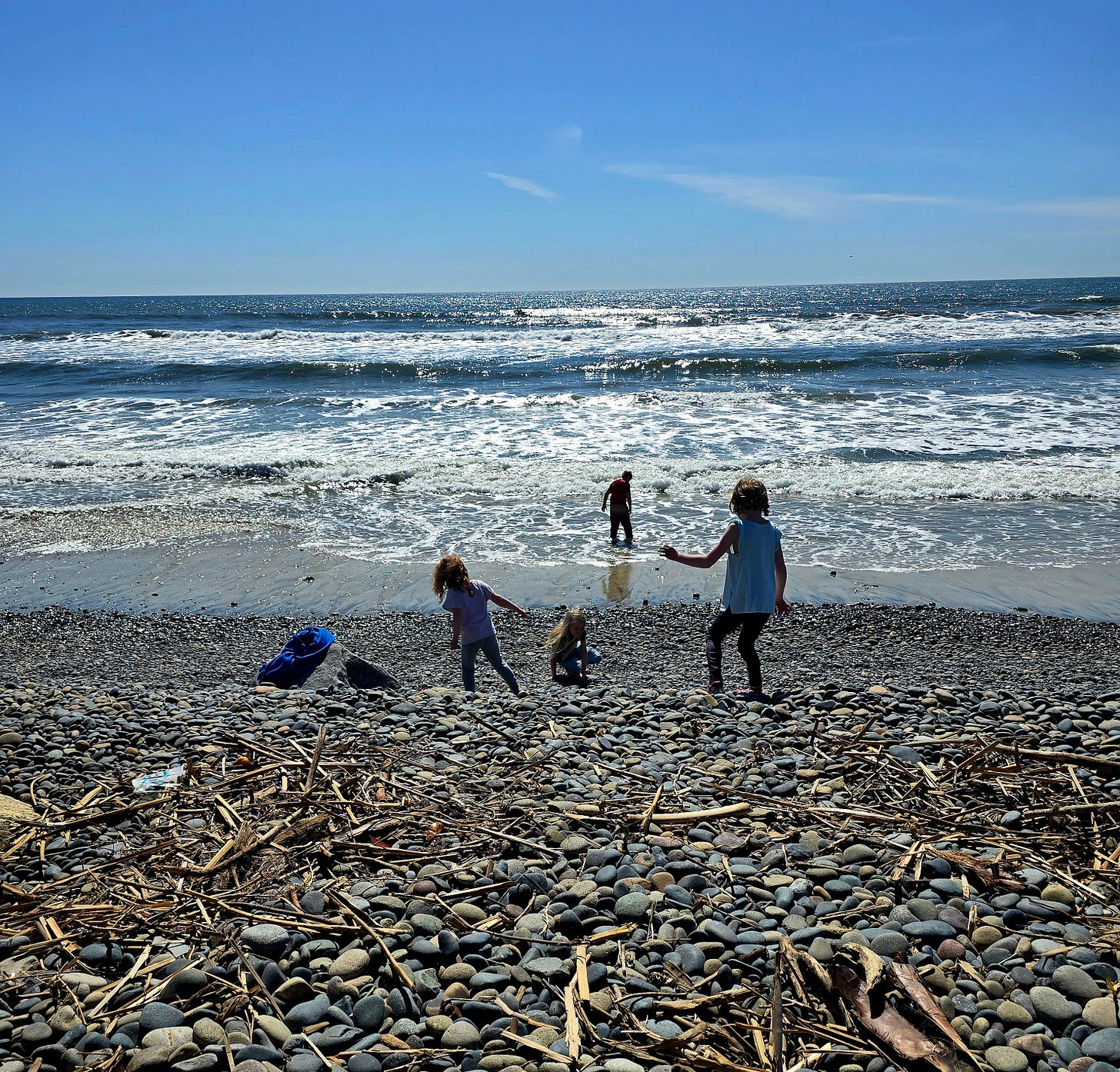There are no adults in the room anymore
The corridors in Washington DC, Wall Street, Silicon Valley, and academia are no longer filled with our best and brightest. What happened?

Before this week’s column, please allow me to explain my recent absence. My family and I just returned from a spring break trip to sunny southern California from cold and snowy Idaho. I’d intended to get a column off before we left 10 days ago, but anyone who’s ever tried to herd four kids into an RV for a week’s vacation by themselves will understand the madness of getting out the door and underway. My profoundest apologies for disappearing without notice.
My two foster kiddos had never been anywhere beyond eastern Idaho before this trip. Watching them experience the Mojave Desert, Legoland, the San Diego Zoo, and the ocean for the first time was worth every penny spent. My own kids, seasoned road warriors, got them quickly up to speed. It was the smoothest RV road trip of my experience. I think that there’s something to the concept of addition via subtraction.
Here are a few photos.


Thanks for your indulgence. Here’s the column.
A decade ago, upon retiring from a university career after 25 years, I decided to try something new, helming a 50-state non-profit that advocated for what is unfortunately (and I believe incorrectly) seen as a conservative cause: multi-use recreational access of public lands. Directing a conservative 501(c)(3) is a challenging task, given the disproportionate presence of left-leaning charities in the nonprofit sector. You are on your own.
Being the executive director of a “conservative” nonprofit was an eye-opening experience in more ways than one. The first thing that I discovered is that everything you’ve heard about bias against conservative (or allegedly conservative) organizations by the federal bureaucracy and the press is entirely true. The second is that the alleged dysfunction within the beltway in Washington, DC, is everything it’s cracked up to be.
Part of my job involved spending time in DC dealing with the agencies that manage our public lands, trying to influence policy. This was during the first Trump administration. The membership of my organization was overjoyed with the prospect of putting wins on the board. But it wasn’t that easy. Though I enjoyed ready access to my congressional delegation and the relevant agencies, nothing much, in terms of policy, changed from Obama to Trump. Anything that Trump could not accomplish with executive orders seemed uninteresting to him. My congressional representatives and their staffs were as accommodating as they could be, but in the end, could offer little other than apologies.
Anything that required legislation, which is what we needed, just wasn’t going to get done. People in the agencies, whether they were sympathetic to our cause or not, were just keeping their heads down, riding the storm out. Everything that we wanted was so close, yet remained tantalizingly just out of reach.
As frustrating as this was, it wasn’t the worst. I met plenty of people in DC that I liked and thought were good at what they did. That’s the good news. The bad news is that these were in the minority. Most of DC is staffed by people whose sole desire is to perpetuate their professional existence, and they will do or say anything to further that cause. Ideas are far less important to them than a steady job. So while there are good hands here and there, DC is filled with some of the most vapid, insincere, and oleaginous people that you will ever meet, all reeking of Chanel Bleu de Chanel and Padróns. They are not like you and me.
At one point during this time, I was invited to give a TED-style talk at the Department of the Interior on the future of public lands. Each presenter was required to submit a bio for the conference brochure. Since I was presenting on multiple uses of public lands, I included all of the ways I’d recreated on public lands: climbing, skiing, mountain biking, paddling whitewater, dirt biking, trail running, and hiking. This three-day conference was attended by high-ranking officials from both the Forest Service and Bureau of Land Management, and about 24 presenters, including myself. United States Secretary of the Interior, Ryan Zinke, participated via a televised address. His undersecretary was the conference chair. It was as big time as it gets in outdoor rec politics.
For reasons that I was slow to comprehend, I was treated (quite undeservedly) like a rock star at this event. After a while it dawned on me that despite the fact that everyone in the room made their living from outdoor recreation, I was the only person among several hundred in attendance who’d climbed El Cap, paddled class III rapids in an open canoe, trail run most of the southern AT, dirt biked all over the western US, skied the steep and deep in the mountains, mountain biked the length of the Daniel Boone National Forest, and summited peaks over 12,000’. Absolutely none of this is exceptional among my cohort (I am, I assure you, quite average in this regard). It should not have been exceptional in that room either. But in DC, relevant experience is not generally a prerequisite for a job.
At one point, the undersecretary himself complimented me on my CV and mentioned, wistfully, how much he’d like to hike even a little bit of the Appalachian Trail. As I talked with other participants both at the conference and over drinks after hours, I didn’t meet more than a handful who actually spent much time in the outdoors. Most were there to sell the government and recreational community on some product they were hawking. Many had never visited, much less recreated in, any national park more than a few hundred miles from DC. All of this being the case, it should not have surprised me that the recommendation from this conference to the Department of Interior of how best to promote the future use of public lands was to facilitate universal access to high-speed Internet everywhere, from the summit of Denali to the middle of Death Valley, to make sure that every visitor could post selfies on social media.
Me, riding a dirt bike in the middle of nowhere was improper to these folks, but encouraging another nimrod to take a selfie before falling into a scalding, acidic hot spring in Yellowstone was just fine. That was the level of thought. I could have cried from frustration. To make matters worse, they ran out of bourbon during the lengthy Delta flight back home.
So Jeffrey Goldberg’s March 24 piece in The Atlantic, The Trump Administration Accidentally Texted Me Its War Plans, came as little surprise. Even if you are no fan of either The Atlantic or Mr. Goldberg, I recommend that you read this piece. It’s well-written, appears factual, and is remarkably careful in its assertions. I’m not at all surprised at revelations of high-ranking government officials mishandling intelligence simply because I’m accustomed to their mediocrity (which is exceeded only by their self-serving mendaciousness). Joe Biden, Donald Trump, Hillary Clinton, along with numerous officials in the Obama and Bush administrations, all egregiously mishandled intelligence. The only substantive difference in any of this is who’s able to put points on the board over it. Mishandling intelligence is distressingly common in DC. And the only people who are ever accountable for doing so are low-level professional employees of various agencies. If you are waiting for any cabinet or above level official to be held accountable, don’t hold your breath.
Why, you ask? Well, in my opinion, it’s because there are almost no adults in the rooms where important decisions are made anymore. Toxic tribalism, declining standards for what constitutes achievement, and strong disincentives to go into politics or high-level government service for smart, moral, and ethical individuals have rendered the cupboard bare in DC. Academia is even worse. The military, Wall Street, and Silicon Valley aren’t far behind. If all of that doesn’t scare you, it probably should.
Pete Hegseth, the United States Secretary of Defense in the middle of “Signalgate,” didn’t get his job because he’s the best and brightest; he got it because he’s got military bona fides, said things that Trump likes on TV, and has ideas popular in MAGA world. If serving in the military, being frequently featured on TV, and having unconventional ideas were considered good qualifications, Timothy McVeigh would have made the cut (if not for being deceased).
Yet it’s really hard for me to get particularly wound up about Hegseth because, again, we’ve seen this movie before. The previous administration thought that a cross-dressing thief of women’s luggage was qualified to supervise our nation’s nuclear waste and that a science-denying trans woman was qualified to be the U.S. Assistant Secretary for Health. How is any of this worse than that?
This is the same reason that it’s hard for me to get overly wound up about most things Trump. I expected things to go just about the way they have, which is why I voted for Alfred E. Neuman for president. Even though I think that Trump is mostly an ideological wrecking ball, he’s easier for me to tolerate than his predecessor, the only person, I suspect, who has ever worn Depends in the Oval Office, probably not knowing about them.
Concerned about the erosion of civil liberties? Me too. That’s why my level of distress over Trump’s assaults on personal freedom and the First Amendment, be they as they are, is about the same as my distress over various assaults on all of the above from the Biden and Obama administrations. All of them chose to interpret the constitution in a manner that defined personal liberty and protected speech as only things that aided their cause.
Obama might have been the worst. As bad as Trump and Biden have been about suppressing disfavored speech and civil liberties, Obama signed the annual National Defense Authorization Act into law in late 2011, which authorized, for the first time, a sweeping worldwide indefinite detention program (no right to appear before a judge) for anyone deemed a terrorist, even American citizens. I regard this as an act of constitutional treason.
Trump’s assaults on science and academic freedom got you bent out of shape? Oh, please. I’ve got a two-word retort: COVID pandemic. Go perch on that.
I read an article in today’s Wall Street Journal about swaths of the faculty, mostly in the social and behavioral sciences, at Columbia University pushing back at interim president Katrina Armstrong’s attempts to face reality. The best part about this is that the faculty who are taking federal funding cuts in the shorts, the medical and scientific faculty, the ones with actual dogs in the fight, are in danger of being shouted down by the same coterie of colleagues who saw no problem whatsoever in outside agitators taking over buildings and disrupting classes at Columbia last year to intimidate Jewish students and faculty. The ones who created the mess in the first place.
I happen to be a supporter of academic freedom and of free speech. But having been in the room during many similar meetings during my academic career, I know all too well how bereft of practical knowledge, self-awareness, or humility many of these clueless, cloistered faculty are. It was often difficult for me not to laugh out loud at the howls of protest from people who thought that academic freedom condensed from the ether right after the Big Bang, just like the mass of a proton or any natural law. And that you could be as stupid as you wanted, for as long as you wanted, on the taxpayers dime, with no consequences.
You want a really good example of no adults in the room outside of DC? Go to a faculty meeting at nearly any college or university in the country. Just don’t expect to feel very good about the future afterwards.
Associated Press and Idaho Press Club-winning columnist Martin Hackworth of Pocatello is a physicist, writer, and retired Idaho State University faculty member who now spends his time with family, riding bicycles and motorcycles, and arranging and playing music. Follow him on Twitter @MartinHackworth, on Facebook at facebook.com/martin.hackworth, and on Substack at martinhackworthsubstack.com








On the other hand, Uncle Jim DID treat your four kids to their first-ever churros ...